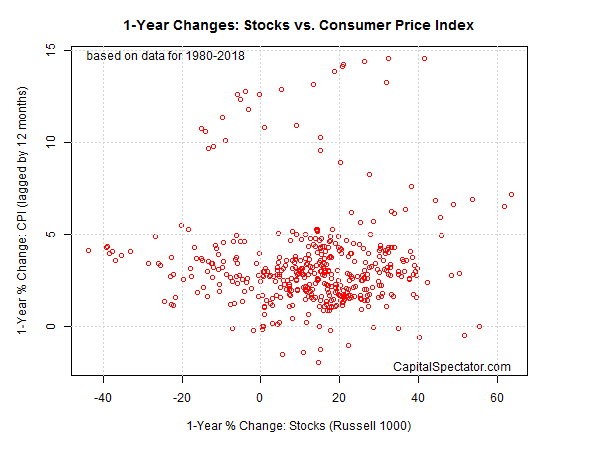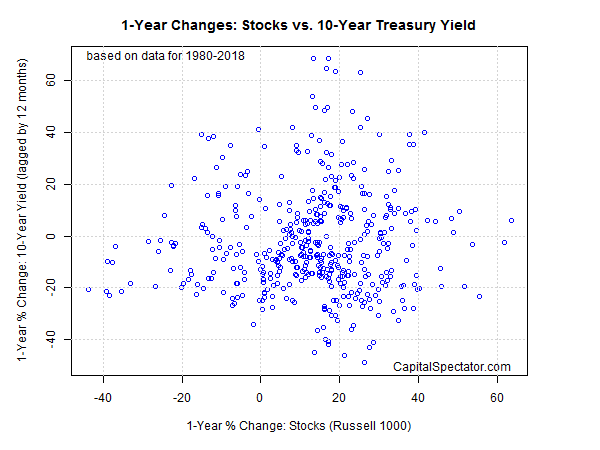Does history offer a reason to be cautious on the outlook for stocks if inflation and interest rates are rising? Yes, sort of, according to a New York Times article published on Thursday.
Hedging just a bit, the Times piece relates that
It’s long been a truism that higher inflation and its close cousin, higher interest rates, are deadly for stock prices. But in the wake of this month’s correction, and the ensuing recovery in stock prices, some market experts are saying that stocks can continue to rally even if interest rates and inflation rise, as they did Wednesday.
The bulls are backed by data showing that, during the six periods of rising 10-year Treasury rates since 1988, the Standard & Poor’s 500-stock index has gained an average of 23 percent. Stocks declined in only one of those periods, and then only modestly.
“For the past 20 years, we’ve had a period of strong correlation between stocks and interest rates,” said Brian Nick, chief investment strategist for Nuveen, a TIAA subsidiary.
But “that wasn’t the case for the 30 years before that,” he added. And looking only at the start and end points of periods of rising rates masks considerable volatility in between, not to mention what lies just outside those periods. As rates were rising from 1998 into 2000, for instance, stocks were in one of the biggest bull markets ever, only to plunge after the technology bubble burst.
Nearly all mainstream economists agree that at some point, higher interest rates and inflation hurt stock prices. “Investors are right to be concerned,” said Alan Blinder, professor of economics at Princeton and former vice chairman of the Federal Reserve.
Let’s dig into the relationship between stocks and rates, and stocks and inflation, a bit deeper. In particular, does the one-year change in the 10-year Treasury yield, or the one-year change in the Consumer Price Index, offer any perspective on what the one-year return on the stock market will be 12 months ahead? To investigate, let’s run a regression on the rolling one-year changes for stocks against the one-year lagged changes for the 10-year yield and CPI.
In the first chart, which compares the one-year change for the Russell 1000 against CPI since 1980 (using monthly data), the relationship looks like noise. A relatively high or low change in CPI (vertical axis) is just as likely to be accompanied by a high, low, or negative shift in stocks a year later. That’s also the message in the correlation for monthly changes, which is basically 0, based on the Russell 1000 one-year change vs. the lagged CPI shift.
 Looking at the stats for the regression analysis of the data doesn’t offer a compelling reason to think that there’s easy money in the short run by using CPI to predict the year-ahead one-year change for stocks. The R-squared for the two datasets, for instance, is roughly 0, which suggests that the connection between the two time series is more or less nil.
Looking at the stats for the regression analysis of the data doesn’t offer a compelling reason to think that there’s easy money in the short run by using CPI to predict the year-ahead one-year change for stocks. The R-squared for the two datasets, for instance, is roughly 0, which suggests that the connection between the two time series is more or less nil.
Residuals: Min 1Q Median 3Q Max -0.56425 -0.08820 0.01945 0.10406 0.51021 Coefficients: Estimate Std. Error t value Pr(>|t|) (Intercept) 0.13325 0.01328 10.031
The profile looks similar when stacking up the one-year change for the Russell 1000 against the lagged one-year change for the 10-year Treasury yield. Indeed, the chart below could be used as a poster boy for random behavior.
 In this case, too, the R-squared is just about 0. Ditto for the correlation on the monthly changes between the two datasets.
In this case, too, the R-squared is just about 0. Ditto for the correlation on the monthly changes between the two datasets.
Does this mean we can safely ignore a rise in rates and/or inflation? Not necessarily, but perhaps a one-year window isn’t long enough to measure the relationship. Also, inflation has been in a downtrend for nearly four decades and so the historical record since 1980 may not offer a relevant window for anticipating what may be coming in the years ahead. Would five- or ten-year windows tell a different story?
As a general principle it’s naïve to think that the stock market will ignore changes in inflation and interest rates. Perhaps the critical variable is the magnitude and profile of the changes. A modest uptick in inflation after an extended period of disinflation may be a minor or even positive event for the equity outlook, particularly if the economic trend stays positive. Alternatively, if inflation and rates rise faster than expected, it may be prudent to revise projections for equity returns for the medium-term horizon.
As usual, hard-and-fast rules are a rare breed when analyzing markets and macro, with at least one exception: The odds for success don’t look encouraging for expecting to make a quick buck by using recent changes in inflation or interest rates as reliable predictors for equity prices in the near term.
Disclosure: Originally published at Saxo Bank TradingFloor.com
